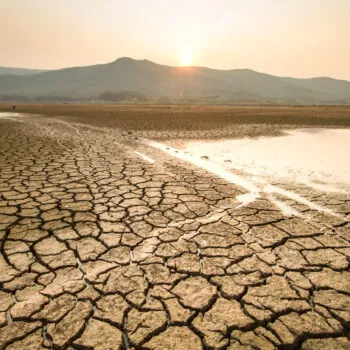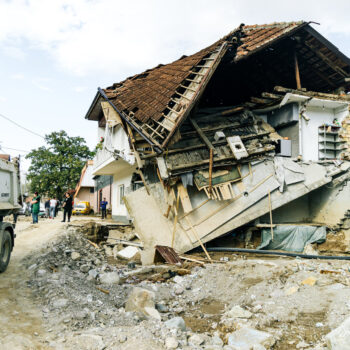COP25 has ended with a whimper and not a bang. International politics are not yet in a place to act on the growing global climate crisis. The good news? In 2020, Europe holds the key to turn these geopolitical tides.
European Commission President Ursula von der Leyen has promised to lead a “geopolitical” Commission. A more assertive Europe in the world could not have come at a more important, or more impactful time. The rise of strongman politics – most notably in the US, Brazil and India – has seen the multilateral system come under fire. At the same time, the looming climate crisis won’t allow us to wait out the geopolitical headwinds. The science by the IPCC and others is clear: a concerted and global effort over the next decade will be critical to getting the world onto a path compatible with the goals of the Paris Agreement. While markets are pulling ahead as climate change starts to impact their bottom lines – governments will need to work together to keep their citizens and societies as safe as their industries.
Recognising this, the new European Commission has not only committed to a more confident approach to foreign policy but has embraced climate neutrality as the new European growth strategy. But in 2020 timing is everything. The issue could not be clearer: either fill the Paris Agreement with life or do barely enough to see it survive.
It takes two to tango
The expectation towards the EU is that it will lead the dance. But it takes two to tango. In the absence of a climate-active US, all eyes are on Europe and whether it can bring the world’s biggest emitter – China – along with it. And with an all of heads of state extraordinary EU-China summit in the works for mid-September in Leipzig Germany, the question is not “can Europe do it” but “will it seize the opportunity?”
The downfall for European foreign policy in the past has been its internal struggles to speak with one voice on the world stage. Now it is expected to engage with Beijing, which has been used to dealing with the centre of command in Washington. Compared to that, the multi-polar nature of European diplomacy – split as it is between confident G20 countries and Brussels – has frequently been more trouble than it was worth. However, with US-China tensions rising and set to continue even under a Democratic president, the EU is suddenly a much more interesting partner – in climate and in trade. This is underlined by the fact that President Xi Jinping has indicated he would represent China at the summit himself, rather than sending Premier Li Keqiang, the usual interlocutor at the annual spring EU-China summits. As such, the September summit is the make or break moment for a more geopolitical Commission. The timing of when Europe starts speaking unitedly about what it intends to do in 2020 and beyond will be key to whether it can successfully engage China.
If successful, the EU-China summit could become the inflection point in next year’s climate calendar: it will pave the way to COP26 in Glasgow, the global temperature check on climate action.
The EU must arrive at the summit with at least:
- A unified message about the increase of the EU Nationally Determined Contribution (NDC) in 2020 ahead of COP26
- Some progress made on the overall emissions reduction target level (55%-65%)
- A message of urgency
This raises two questions domestically: one of process and one of leadership.
Get one’s house in order
The EU does not need a full legislative package ready to implement the emissions target by September 2020. It should, however, have a credible plan on how it will support countries delivering the extra emission cuts and an outline of the legislative actions required to enact the extra cuts.
The EU will need a political process to secure the three elements outlined earlier. This process must be led by Heads of States to be credible in the eyes of China’s leadership.
The European Council is the natural forum for this discussion. The discussion must start now as leaders have signed off on the goal of climate neutrality by 2050. It should be underpinned by an impact assessment to inform the discussion on an increased NDC as soon as possible to enable the first discussion during the European Council of March 2020 at the latest.
The European Green Deal can be the vehicle for some of these policies. China and other major economies will be particularly interested in how climate is reflected in Europe’s industrial strategy. And whether the approach to trade will be one of trade for climate – i.e. working with trade partners to build green trade and supply chains – or one of trade vs climate – which leans hard into border adjustment mechanisms. In that regard, the Commission communication on the European Green Deal sends a clear signal: “Should differences in levels of ambition worldwide persist, as the EU increases its climate ambition, the Commission will propose a carbon border adjustment mechanism, for selected sectors, to reduce the risk of carbon leakage.”
Leadership
There are three natural champions that could successfully engage China.
European Council President Charles Michel is the natural contender. As the current head of the European Council, he is a credible interlocutor of China, able to speak on behalf of the EU. His climate credentials from his previous post as Belgian PM could however, be significantly improved. He will need to earn the right to represent the EU by skillfully conducting the negotiations leading up to September. It would be a major achievement for him if he succeeds in engaging China.
He’s not the only one in the running for the title of “Champion of the Paris Agreement”.
French President Emmanuel Macron is closely behind. He successfully engaged China recently. However, for all his success abroad, internal European diplomacy is where President Macron frequently underinvests. His gung-ho approach has in the past left France isolated where he could have built alliances and his regular critiques of Central Europe do not make him the best candidate to speak on behalf of the whole of Europe.
Finally, German Chancellor Angela Merkel could also rise to the task. Germany will preside over the Ministerial deliberation in the second half of 2020 and the Summit is indeed happening in Germany. The fragile situation of the coalition currently running Germany and its disappointing domestic policy however impacts the credibility of the chancellor.
An ideal scenario would therefore be:
- The Commission puts forward a draft impact assessment for an enhanced NDC as soon as possible – and before the European Council of March 2020.
- Charles Michel leads the discussion on the increase of the EU NDC, starting in March 2020, with the objective of securing a commitment, a range and a sense of urgency well before September 2020.
- These discussions create a basis for European-Chinese discussions on climate at the regular EU-China summit (likely in April 2020, attended only by heads of European institutions, rather than all member states).
- Angela Merkel, as host, and Emmanuel Macron, as an influential Head of State, engage with China’s leadership together with Charles Michel throughout the first half of 2020. Ahead of a similar US-China agreement in 2015 both President Obama and Secretary of State John Kerry made frequent preparatory trips to China throughout the year. Together they can lead a discussion that includes climate, trade and bilateral cooperation more generally.
- In September 2020, the EU and China agree.
There’s more than enough work for several people to take the lead. What we are lacking is time and the unity needed to engage the domino of China that can bring other major economies, developed and emerging, along for the ride. Missing that window means an uphill battle into COP26.


